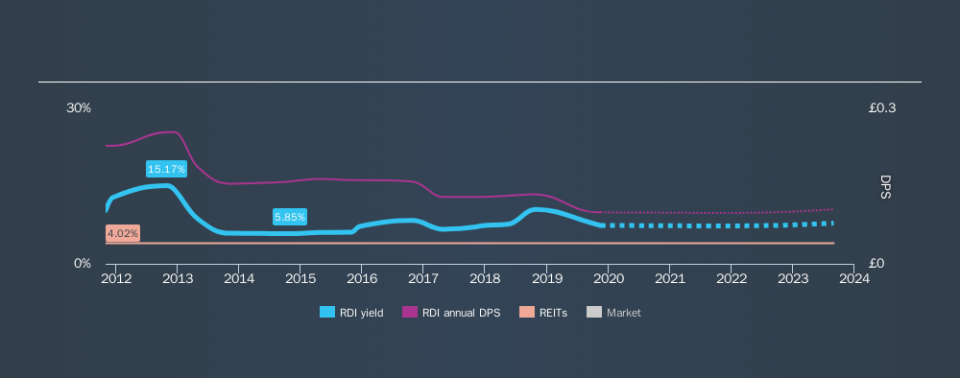Dividend Investors: Don't Be Too Quick To Buy RDI REIT P.L.C. (LON:RDI) For Its Upcoming Dividend

Some investors rely on dividends for growing their wealth, and if you're one of those dividend sleuths, you might be intrigued to know that RDI REIT P.L.C. (LON:RDI) is about to go ex-dividend in just 2 days. If you purchase the stock on or after the 21st of November, you won't be eligible to receive this dividend, when it is paid on the 10th of December.
RDI REIT's next dividend payment will be UK£0.06 per share. Last year, in total, the company distributed UK£0.10 to shareholders. Based on the last year's worth of payments, RDI REIT stock has a trailing yield of around 7.5% on the current share price of £1.342. Dividends are a major contributor to investment returns for long term holders, but only if the dividend continues to be paid. We need to see whether the dividend is covered by earnings and if it's growing.
See our latest analysis for RDI REIT
Dividends are typically paid from company earnings. If a company pays more in dividends than it earned in profit, then the dividend could be unsustainable. It paid out 83% of its earnings as dividends last year, which is not unreasonable, but limits reinvestment in the business and leaves the dividend vulnerable to a business downturn. We'd be concerned if earnings began to decline. While RDI REIT seems to be paying out a very high percentage of its income, REITs have different dividend payment behaviour and so, while we don't think this is great, we also don't think it is unusual. With the recent loss, it's important to check if the business generated enough cash to pay its dividend. If cash earnings don't cover the dividend, the company would have to pay dividends out of cash in the bank, or by borrowing money, neither of which is long-term sustainable. Over the last year it paid out 73% of its free cash flow as dividends, within the usual range for most companies.
Click here to see how much of its profit RDI REIT paid out over the last 12 months.
Have Earnings And Dividends Been Growing?
When earnings decline, dividend companies become much harder to analyse and own safely. If earnings decline and the company is forced to cut its dividend, investors could watch the value of their investment go up in smoke. RDI REIT was unprofitable last year and, unfortunately, the general trend suggests its earnings have been in decline over the last five years, making us wonder if the dividend is sustainable at all.
Another key way to measure a company's dividend prospects is by measuring its historical rate of dividend growth. RDI REIT's dividend payments per share have declined at 9.9% per year on average over the past eight years, which is uninspiring. While it's not great that earnings and dividends per share have fallen in recent years, we're encouraged by the fact that management has trimmed the dividend rather than risk over-committing the company in a risky attempt to maintain yields to shareholders.
Remember, you can always get a snapshot of RDI REIT's financial health, by checking our visualisation of its financial health, here.
Final Takeaway
Is RDI REIT an attractive dividend stock, or better left on the shelf? We're a bit uncomfortable with it paying a dividend while being loss-making. However, we note that the dividend was covered by cash flow. It's not the most attractive proposition from a dividend perspective, and we'd probably give this one a miss for now.
Want to learn more about RDI REIT's dividend performance? Check out this visualisation of its historical revenue and earnings growth.
If you're in the market for dividend stocks, we recommend checking our list of top dividend stocks with a greater than 2% yield and an upcoming dividend.
We aim to bring you long-term focused research analysis driven by fundamental data. Note that our analysis may not factor in the latest price-sensitive company announcements or qualitative material.
If you spot an error that warrants correction, please contact the editor at editorial-team@simplywallst.com. This article by Simply Wall St is general in nature. It does not constitute a recommendation to buy or sell any stock, and does not take account of your objectives, or your financial situation. Simply Wall St has no position in the stocks mentioned. Thank you for reading.

